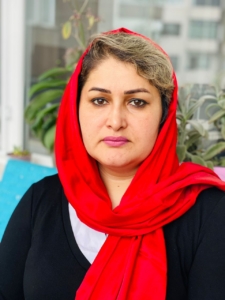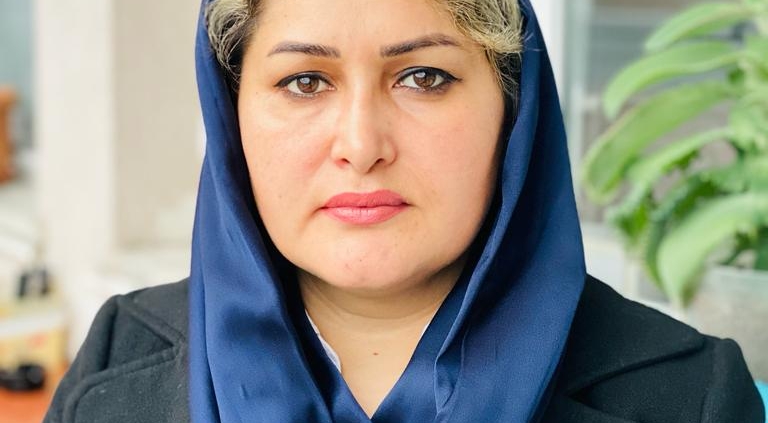Breaking taboos in Afghanistan, persisting in exile
Kreshma Fakhri
IAWRT International Board member
“We, along with other women active in Afghan media, broke taboos. We demonstrated to Afghan society that women have the right to work, speak out, inform, conduct research, hold the government accountable, and be accountable themselves. Collectively, we, the media in Afghanistan, provided awareness to Afghan women, encouraging them to participate in social activities, learn, work, and contribute to the destiny of their country.”
Kreshma Fakhri replied with these powerful words when asked about her and her media outfit’s contribution to her country. These words are an important reminder of what women in Afghanistan have achieved—but were again starting to lose when the Taliban took over Kabul in August 2021.
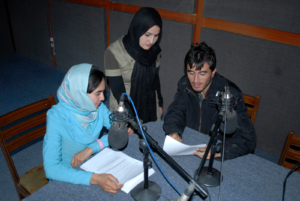
“Women working in the media are concerned about their safety, as their presence in the media makes them vulnerable to threats, violence, and detention. Some women now work covertly in the media. Those who are employed are forced to sign agreements ensuring that they do not publish anything contrary to the ruling group’s interests, or else they face legal consequences,” shared Kreshma.
Kreshma believes that not only for Afghanistan journalists but also for journalists anywhere in the world, these challenges present an unprecedented situation.
“Unless there are fundamental changes in Afghanistan’s political system and women are granted their basic rights, the number of women in television and radio will dwindle to zero, which is something that should never happen,” Kreshma said.
After being forced to leave her homeland and coming to Turkey when the Taliban returned to power, Kreshma said she spent some time away from media activities.
“During this period, I tried to collaborate with Afghans who had recently arrived in Turkey, faced language barriers, and were unfamiliar with the environment and society. However, following the collapse of the republic system in Afghanistan, I couldn’t remotely observe the challenging conditions faced by my fellow countrywomen,” said Kreshma.
But she couldn’t stay away from journalism for too long. Kreshma would find a way to continue her work.
“I began my work by preparing a report on the situation of female police officers after the fall of the republic system. This motivated me to be a remote advocate for the voices of women and my compatriots. Eventually, I, along with some colleagues and female reporters, founded Media Zan Times. We endeavored to continue informational activities remotely, writing for both Afghan women and men, and reporting to the world on the challenging circumstances of Afghan women and men living under the security and economic constraints imposed by the Taliban,” Kreshma shared.
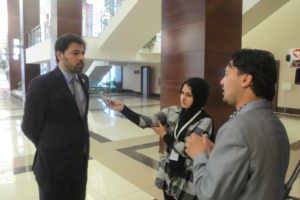
Kreshma joined the media industry a long time ago when Afghanistan, after many difficult years, was once again experiencing democracy and freedom of expression.
“Women and girls were going to school, and women’s civil movements were taking shape day by day,” shared Kreshma.
However, some women and girls still did not have access to their basic rights and fell victim to harmful cultural practices.
“Women journalists and media workers in Afghanistan face numerous challenges, and they are deprived of their most fundamental right, which is the right to be seen and heard. They lack access to news sources, and due to cultural and societal constraints, women cannot easily work in the media. They also face sanctions and gender discrimination,” shared Kreshma.
After a year following her graduation from university, she joined the Investigative team of Killid Group.
“In mid-2009, while I was a third-year student majoring in literature at Kabul University, I began my formal career with a local media outlet called Killid Group. Initially, my main responsibilities included news reporting and radio program production. This team, consisting mainly of men, included around ten male colleagues in Kabul and some other provinces, and I was the only young woman who started working in this department,” recalled Kreshma.
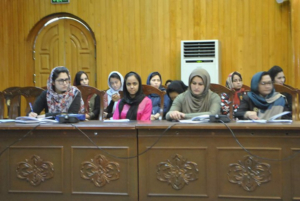
She said the primary focus of this team was to investigate and research cases of human rights violations in Afghanistan and cases of administrative corruption.
“At that time, despite the challenges, I managed to work alongside my male colleagues in pursuit of the team’s goals. I started my career in journalism to inform people about the challenges faced by women and to highlight their progress. I wanted to contribute to media work in sharing the experience of democracy and freedom of expression,” Kreshma added.
Apart from gender representation, Kreshma shared that the major challenges she faced were predominantly security-related.
“Working in traditional Afghan society and engaging in investigative journalism within a society and government tainted by administrative, financial, and security corruption was not easy, especially for women. I struggled with numerous security issues and threats and witnessed life-threatening threats against myself,” she shared.
This came to the point that she had to leave Afghanistan in late 2017, before the official launch of the International Association of Women in Radio and Television (IAWRT) Afghanistan chapter.
While working as an investigative journalist with Killid Group, she joined the Afghanistan chapter of IAWRT, in collaboration with Najiba Ayubi who is the head of Killid Group.
“At that time, Ms. Ayubi, who was a member of the association, aimed to establish the Afghanistan chapter, and I was one of the first individuals to work with her in the process of founding and managing the administrative aspects of the association within Afghan government institutions. I helped in drafting the charter, organizing board meetings, and coordinating administrative affairs. Eventually, we successfully registered the chapter officially within the Afghan Ministry of Justice,” recalled Kreshma.
She continued to follow her chapter’s activities wherever she was.
In 2022, she was elected as IAWRT International Board member for 2022 to 2024.
“Last year, I decided to elevate my involvement with this association to the international board level, so I became a candidate for the IAWRT board. As a result of a transparent election process, I managed to secure membership on the board, allowing me to contribute to its international activities,” said Kreshma.
As part of the international board of IAWRT, Kreshma took part in the monthly board meetings of the association and the work of the Afghanistan support committee.
“The focus has been on addressing key work issues and tackling the challenges faced by Afghan women journalists in Afghanistan, Pakistan and other countries. Additionally, there has been an emphasis on continuing collaboration with journalists still working within Afghanistan,” she spoke of the work of the Afghanistan support committee of IAWRT.
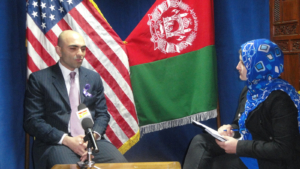
Being part of the IAWRT International board, Kreshma wanted to be able to do for women journalists on a wider scale what she and other women in Afghanistan have been able to do—breaking taboos to be able to speak out, learn, work, participate.
“I aspire to witness an increase in the number of women in the media. I want, through the efforts of IAWRT, to enhance the professional capacities of women. I hope, with the assistance of IAWRT, to draw attention to and support women journalists working in conflict-ridden countries, including Afghanistan, so that they can have both personal and professional security, and so that the scope and quality of their professional activities can improve,” said Kreshma.
As many of the gains of women in Afghanistan are being taken away, Kreshma believes there is much work to be done.
“I want to advocate for and inform women through the media. Many women in Afghanistan and other countries still rely on and expect the media to take action on their behalf. Therefore, I strive to be their voice in the media. I aim to work more diligently and earnestly in decision-making and policy-making roles for both women and men,” said Kreshma.
Having seen and experienced many difficulties in her work as a journalist, Kreshma advised that women in media should be strong and resilient.
“Working in the media can be challenging at times. They need to learn the skills of dealing with difficulties and even threats. They should not shy away from learning and set ambitious goals for themselves, striving to achieve them. Because they can be a beacon of hope for many women who do not have the right to raise their voices,” Kreshma said.
